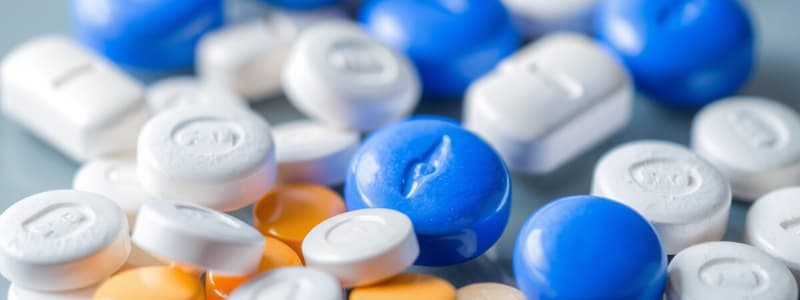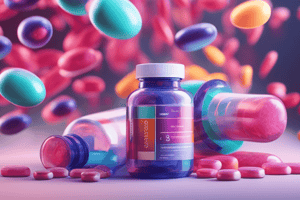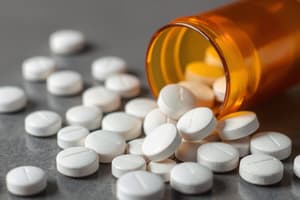Podcast
Questions and Answers
Which side effect is specifically associated with Haloperidol?
Which side effect is specifically associated with Haloperidol?
- Urinary retention
- Tardive dyskinesia (correct)
- Dry mouth
- Sedation
What is the primary purpose of adding a benzodiazepine like Lorazepam when administering Haloperidol?
What is the primary purpose of adding a benzodiazepine like Lorazepam when administering Haloperidol?
- To control aggressive behavior (correct)
- To prevent sedation
- To enhance mood stabilization
- To increase dopamine levels
Which medication is indicated for treating severe anxiety but is also known to have a high potential for addiction?
Which medication is indicated for treating severe anxiety but is also known to have a high potential for addiction?
- Olanzapine
- Midazolam (correct)
- Fluoxetine
- Hydroxyzine
What is a common side effect of the second-generation antipsychotic Olanzapine?
What is a common side effect of the second-generation antipsychotic Olanzapine?
Which of the following medications is a beta-blocker used to alleviate physical symptoms of anxiety?
Which of the following medications is a beta-blocker used to alleviate physical symptoms of anxiety?
Which antipsychotic has the potential to cause agranulocytosis and requires regular blood monitoring?
Which antipsychotic has the potential to cause agranulocytosis and requires regular blood monitoring?
What is a notable side effect of Fluoxetine?
What is a notable side effect of Fluoxetine?
Which symptom is a sign of Neuroleptic Malignant Syndrome that requires immediate attention?
Which symptom is a sign of Neuroleptic Malignant Syndrome that requires immediate attention?
Which of the following side effects is common with first-generation antipsychotics like Haloperidol?
Which of the following side effects is common with first-generation antipsychotics like Haloperidol?
What is the typical duration of action for Clonazepam when used as an anxiety medication?
What is the typical duration of action for Clonazepam when used as an anxiety medication?
What is a potential side effect of taking Amitriptyline?
What is a potential side effect of taking Amitriptyline?
Which medication interacts with tyramine and could lead to a hypertensive crisis when taken together?
Which medication interacts with tyramine and could lead to a hypertensive crisis when taken together?
What is the therapeutic range for Lithium, above which toxicity is a concern?
What is the therapeutic range for Lithium, above which toxicity is a concern?
Which medication should NOT be combined with SSRIs?
Which medication should NOT be combined with SSRIs?
What is a common side effect of Serotonin Norepinephrine Reuptake Inhibitors (SNRIs)?
What is a common side effect of Serotonin Norepinephrine Reuptake Inhibitors (SNRIs)?
Which mood stabilizer requires monitoring of liver function due to potential hepatotoxicity?
Which mood stabilizer requires monitoring of liver function due to potential hepatotoxicity?
What is a reported side effect of the antipsychotic medication Clozapine?
What is a reported side effect of the antipsychotic medication Clozapine?
Which of the following is a common side effect of Bupropion?
Which of the following is a common side effect of Bupropion?
What condition is treated with propranolol as part of its therapeutic indications?
What condition is treated with propranolol as part of its therapeutic indications?
Which class of antidepressants is usually considered first-line treatment for depression?
Which class of antidepressants is usually considered first-line treatment for depression?
Which of the following medications can lead to serotonin syndrome if not used carefully?
Which of the following medications can lead to serotonin syndrome if not used carefully?
The use of which of the following medications involves a risk of inducing mania without a mood stabilizer?
The use of which of the following medications involves a risk of inducing mania without a mood stabilizer?
What dietary restriction is crucial for patients taking Monoamine oxidase inhibitors (MAOIs)?
What dietary restriction is crucial for patients taking Monoamine oxidase inhibitors (MAOIs)?
Which of the following medications is used as a first-line treatment for opioid withdrawal?
Which of the following medications is used as a first-line treatment for opioid withdrawal?
Flashcards
Haloperidol (Typical Antipsychotic)
Haloperidol (Typical Antipsychotic)
A first-generation antipsychotic used to manage positive symptoms of schizophrenia and related conditions, like hallucinations. It is sometimes given with a benzodiazepine like Lorazepam to help control aggressive behavior.
EPS (Extrapyramidal Symptoms)
EPS (Extrapyramidal Symptoms)
A range of movement-related side effects caused by some psych meds, including dystonia, parkinsonism, and akathisia.
Tardive Dyskinesia
Tardive Dyskinesia
A potentially irreversible movement disorder that's a long-term side effect of some antipsychotic medications.
Neuroleptic Malignant Syndrome (NMS)
Neuroleptic Malignant Syndrome (NMS)
Signup and view all the flashcards
Olanzapine (Atypical Antipsychotic)
Olanzapine (Atypical Antipsychotic)
Signup and view all the flashcards
Propranolol (Beta-blocker)
Propranolol (Beta-blocker)
Signup and view all the flashcards
Benzodiazepines
Benzodiazepines
Signup and view all the flashcards
SSRI (Fluoxetine)
SSRI (Fluoxetine)
Signup and view all the flashcards
Anticholinergic effects
Anticholinergic effects
Signup and view all the flashcards
Weight Gain
Weight Gain
Signup and view all the flashcards
Amitriptyline use
Amitriptyline use
Signup and view all the flashcards
Selegiline/Phenelzine
Selegiline/Phenelzine
Signup and view all the flashcards
SSRI medications
SSRI medications
Signup and view all the flashcards
SNRI medications
SNRI medications
Signup and view all the flashcards
Bupropion use
Bupropion use
Signup and view all the flashcards
Lithium therapeutic range
Lithium therapeutic range
Signup and view all the flashcards
Lithium side effects
Lithium side effects
Signup and view all the flashcards
Valproate (Divalproex) therapeutic range
Valproate (Divalproex) therapeutic range
Signup and view all the flashcards
Lamotrigine side effect
Lamotrigine side effect
Signup and view all the flashcards
Methylphenidate use
Methylphenidate use
Signup and view all the flashcards
Atomoxetine
Atomoxetine
Signup and view all the flashcards
Naltrexone
Naltrexone
Signup and view all the flashcards
Disulfiram
Disulfiram
Signup and view all the flashcards
Naloxone
Naloxone
Signup and view all the flashcards
Study Notes
Haloperidol
- First-generation typical antipsychotic, controls positive symptoms of schizophrenia and Tourette's.
- Used with benzodiazepines (like Lorazepam) to manage aggressive behavior.
- Side effects include extrapyramidal symptoms (EPS), tardive dyskinesia, and sedation.
- Risk of neuroleptic malignant syndrome (NMS), characterized by high fever and tremors.
- Benztropine may be used to reduce EPS.
Diphenhydramine
- Antihistamine, a first-generation antihistamine.
- Side effects include sedation, urinary retention, and difficulty with bowel movements (constipation).
- Can be used to prevent dystonic reactions.
Midazolam
- Fast-acting benzodiazepine.
- Highly addictive and not suitable for long-term use.
- Common side effects include sedation and suppression of vital signs (ABCs) and should avoid activities that require alertness.
- Should not be stopped abruptly.
Olanzapine
- Second-generation atypical antipsychotic.
- Controls positive and negative symptoms of schizophrenia.
- Side effects include weight gain, decreased libido, and neutropenia (low white blood cell count).
- Monitor blood sugar and signs of infection.
Ziprasidone
- Atypical antipsychotic, balancing dopamine levels in the brain.
Hydroxyzine
- Antihistamine (PRN).
- Immediate action (15-30 minutes).
- Side effects include dry mouth and drowsiness.
- Dosage: 25-50mg 4 times daily with a maximum dose of 100mg.
Lorazepam
- Benzodiazepine (short-intermediate acting, PRN).
- 20-40 minutes to take effect, with duration of 4-6 hours.
- Side effects include drowsiness and sedation.
- Dosage: 0.5-2mg 2-3 times daily, with a maximum of 10mg/day.
Clonazepam
- Intermediate-acting benzodiazepine (PRN).
- Take effect in 20-40 minutes, lasting 6-12 hours.
- Side effects include ataxia (loss of coordination), dizziness, and drowsiness.
- Dosage: 0.25-1mg 1-2 times daily, with a maximum of 4mg daily.
Fluoxetine
- Selective serotonin reuptake inhibitor (SSRI)
- May need 2-12 weeks to show improvements
- Side effects include decreased libido, sexual dysfunction, dry mouth, headache, insomnia, and tremors, in addition to common GI issues
- Dosage: 10-20 mg daily, maximum 60mg daily.
Propranolol
- Beta-blocker (PRN).
- Takes 30-60 minutes to act, lasting 6-12 hours.
- Side effect includes hypotension
- Dosage: 10-20 mg 30-60 minutes prior to anxiety-provoking situations.
Other Antipsychotics (First and Second Generation)
- First-generation antipsychotics (typical) include Haloperidol and Fluphenazine. They primarily target positive symptoms of psychosis.
- Second-generation antipsychotics (atypical) such as Aripiprazole, Clozapine, Olanzapine, Risperidone, Quetiapine, and Ziprasidone target both positive and negative symptoms.
Other Medications
- Amitriptyline (TCA) - older antidepressant for sleep issues (when other meds don't work).
- Bupropion - can be used with SSRIs with a focus on the treatment of depression, ADHD, and smoking cessation.
- Methylphenidate and dextroamphetamine - stimulants used to treat ADHD, with possible side effects including mania or growth suppression.
- Atomoxetine - non-stimulant ADHD medication.
- Clonidine - Anti-hypertensive; used in severe cases of withdrawal.
- Guanfacine - Anti-hypertensive.
- Lithium - Mood stabilizer with therapeutic range from 0.6-1.2 mEq/L
- Divalproex Sodium (Valproate) Mood stabilizer and anticonvulsant
- Lamotrigine - used in bipolar disorder.
Withdrawal from Nicotine
- Nicotine gum, lozenge, or patches can be used for cessation.
- Place the gum between the cheek and gum, and bite slowly until tingling stops.
Important Considerations
- Monitoring: Close monitoring of vital signs and potential side effects is crucial for psychiatric medications.
- Interactions: Many psychiatric medications interact with other medications, including those over-the-counter and herbal remedies.
- Patient Education: Educating patients about their medications, potential side effects, and interactions is vital.
- Diet: Tyramine-containing foods are avoided when taking certain medications.
- Pregnancy: Not all medications are safe to take during pregnancy. Consult with healthcare provider.
- Risk and side effects of different medications: Be aware of the range of side effects and the seriousness of some of them, like the risks of seizures, strokes, and heart problems, or liver issues. There are also issues surrounding drug interactions
- Important warnings: Be aware of severe risks from medications with warning labels.
Studying That Suits You
Use AI to generate personalized quizzes and flashcards to suit your learning preferences.
Related Documents
Description
This quiz covers the key features and side effects of various psychiatric medications including Haloperidol, Diphenhydramine, Midazolam, and Olanzapine. Delve into the mechanisms, risks, and therapeutic uses of these drugs in managing mental health conditions and treating aggressive behavior.




